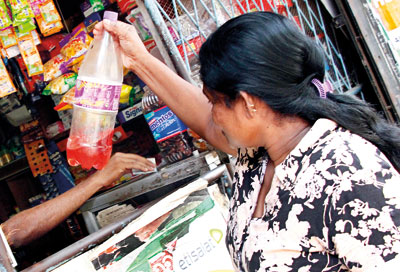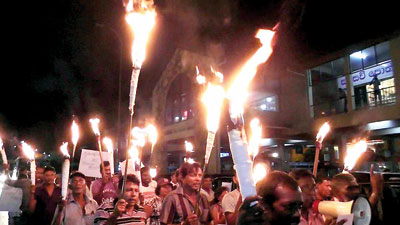News
Fuel prices burn over-burdened masses
There is more pain to come from the sudden, sharp increase in oil and gas prices by the Government in such a brief period, although crude oil prices in global markets have been rising gradually over several months.

A woman buys kerosene at Rs 50. Pic by Indika Handuwala
Crude oil prices in London and New York climbed to new record highs this week as of Friday.
The prices of daily necessities, already heavily taxed by a fiscally irresponsible Government, will rise further.
In rural areas, where 75% of Sri Lankans live, people are at their wits’ end about unbearable costs.
For the poor, the sudden increase in the price of a litre of kerosene by Rs 57 has come as a thunderbolt strike. Even in Colombo, where a considerable number of people still use kerosene, the extra cost has come to bite. Some are now buying kerosene on a daily basis in small quantities.
Amid the outrage and backlash, the embattled Government promised a kerosene subsidy for fishermen and Samurdhi beneficiaries.
The Government failed to devise a fuel pricing mechanism and is only now scrambling to do so, the Sunday Times learns.
Private bus unions demanded, and secured this week, a 12.5% increase in bus fares after threatening to launch a countrywide strike starting Thursday. The minimum fare was raised from Rs 10 to Rs 12. Earlier, the unions had flatly rejected a 6.5% fare increase approved by Cabinet and demanded a 15% increase, before reaching a last minute compromise.
The new price formula is due to be effective from next week after Cabinet approval. A proposal is due to be presented to Cabinet on Tuesday.
As things stand now, however, Sri Lanka Transport Board buses are charging more than private operators. This was after the SLTB went ahead with the 6.56% raise approved by the Cabinet from last Wednesday.
SLTB chairman Ramal Siriwardene, said that if the Cabinet decides to raise bus fares by 12.5%, the SLTB will increase fares accordingly. “Private and state bus fares will be the same after Tuesday,” he said.
Private bus unions, meanwhile, are content with a 12.5% increase, though they warn of further increases based on world crude oil prices.
The general secretary of the All Island Private Bus Owners’ Federation, Anjana Priyanjith, claimed they will not call strikes for a year provided that fuel prices remain steady.
Unions had requested a 15% increase considering the taxes imposed on tyres and equipment by the Government in addition to maintenance costs and the depreciation of the rupee, Mr Priyanjith said.
Three-wheeler operators meanwhile, have increased the fare for the first kilometer from Rs 50 to Rs 60.

Protests against the fuel hike held in Galle. Pic by Sirangika Lokukarawita
Container transporters say charges will be raised by 15% effective today. Prices of lubricants, batteries, tyres and other motor vehicle accessories and parts have been going up steadily over the past several years and the fuel price increase, which came on top of that, made it impossible to continue without an adjustment, Nimal Amarasekere, president of the Association of Container Transporters said.
He noted that container transporters will decide on whether to reduce charges or increase them further, depending on the next fuel price revision. Mr Amarasekere said he could not speculate on how the rise in transport charges will filter through to the prices of consumer goods.
The rise in fares, kerosene, and LP gas are impacting on small businesses, too.
N K Jayawardena, president of the All Ceylon Bakery Owners’ Association, hinted of an increase in the price of bakery products.
He pointed out that the price of 12.5 kilogram LP gas cylinder was increased by Rs 245 last month. There are also smaller eateries that depend on kerosene for cooking.
“We will convene a meeting next week to make a decision,” Mr Jayawardena said.
The price increase will be a burden on people in the plantations, said Central Provincial Councilor Radhakrishnan Rajaram. Many people use kerosene for their daily needs, including for cooking, electricity, and for water pumps. “This should not have happened and they should have thought about the people before taking this decision,” he stressed.
Fisheries unions have already staged protests demanding concessions.
Farmer organisations are also agitating for relief.
Namal Karunaratne, National Organizer of the All Island Farmers’ Federation, said farmers will gather in Colombo on Tuesday for a large scale protest. “The protest in Colombo will be a starting point for other protests which we plan to hold countrywide,” he emphasized.
| Farmers’ woes worsen | |
| Farmers across the country have been severely burdened by rising fuel prices. In areas such as Karuwalagaswewa and Thabbowa in the Puttalam district, where four harvests in succession have failed due to a devastating drought, farmers say the price increase has thrown them from the frying pan into the fire. They point out that there are not many means to make a living in these areas, aside from farming. Young men have started to migrate to towns and cities in search of work as labourers, while women have been seeking domestic work in households. The hiring charges for tractors needed to plough the fields, collect the harvest and transport the paddy, have risen. Farmers will also have to pay more to hire machines used to cut grass, or spray insecticide. For vegetable farmers, who are already struggling to sell their excess produce, transport costs needed to take their produce to Dambulla and Colombo have also gone up. Mr Karunaratne insists on a kerosene and diesel subsidy for farmers, adding that farmer organizations were preparing nationwide protests to press authorities into granting this concession. Additional Reporting by Jayaratne Wickramaarachchi in Karuwalagaswewa |
| Fisheries and Samurdhi: Tangled up in kerosene knot | |
| The Government has so far been unable to devise a mechanism to issue kerosene at subsidised rates to fishermen, Samurdhi beneficiaries and those without electricity. Minister of Social Empowerment, P Harrison told the Sunday Times that talks have begun with the Finance Ministry on devising a mechanism to issue kerosene to Samurdhi beneficiaries under the previous price of Rs 44. Divisional Secretariats have been instructed to send records of households in their divisions that do not have electricity, while the ministry has also shared its records with the Finance Ministry, Mr Harrison said. “We expect the mechanism to be ready in about a week,” he remarked. Issuing a kerosene subsidy to fishermen has also become problematic due to differences of opinion among fisheries associations. While some agree with the Government’s proposal to debit money directly to bank accounts of fishermen, others want kerosene to be sold to them at the previous price of Rs 44, perhaps by adding a colourant to the fuel to identify it if it is sold illegally elsewhere. Some unions are also demanding that the Government reduce the price of kerosene to Rs 44 for everyone. “There is still a debate on the mechanism to be used to issue kerosene to fishermen,” acknowledged Vijith Wijayamuni Zoysa, Minister of Fisheries and Aquatic Resources Development. He said discussions have begun with the Minister of Petroleum Industries to figure out the best way to issue kerosene to fishermen. Some fisheries associations however, charge that they have already been notified to have their members fill out applications to be eligible for a coupon to obtain a kerosene subsidy. “This is a farce. They are talking to us on a mechanism on one side and insisting we apply for coupons on the other,” fumed Aruna Roshantha, President of the All Ceylon Fisherfolk Trade Union. Mr Roshantha pointed out that the Government only started to talk to the fisheries associations about a kerosene subsidy after the fuel price increase. “They should have devised a plan for this before the price increase. Now, we are still having to pay Rs.101 per litre of kerosene under the new pricing system.” |

